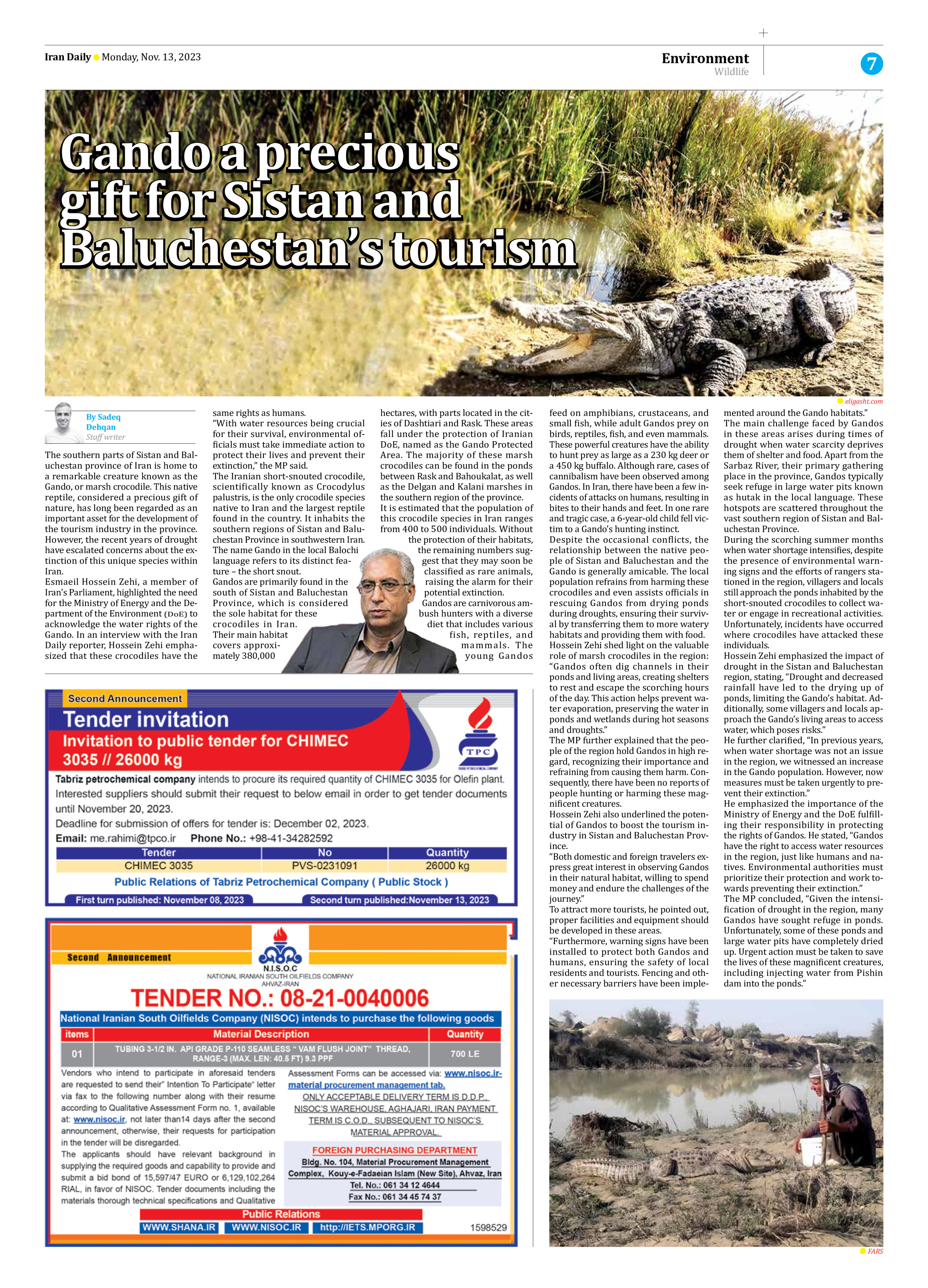
Gando a precious gift for Sistan and Baluchestan’s tourism
By Sadeq Dehqan
Staff writer
The southern parts of Sistan and Baluchestan province of Iran is home to a remarkable creature known as the Gando, or marsh crocodile. This native reptile, considered a precious gift of nature, has long been regarded as an important asset for the development of the tourism industry in the province. However, the recent years of drought have escalated concerns about the extinction of this unique species within Iran.
Esmaeil Hossein Zehi, a member of Iran’s Parliament, highlighted the need for the Ministry of Energy and the Department of the Environment (DoE) to acknowledge the water rights of the Gando. In an interview with the Iran Daily reporter, Hossein Zehi emphasized that these crocodiles have the same rights as humans.
“With water resources being crucial for their survival, environmental officials must take immediate action to protect their lives and prevent their extinction,” the MP said.
The Iranian short-snouted crocodile, scientifically known as Crocodylus palustris, is the only crocodile species native to Iran and the largest reptile found in the country. It inhabits the southern regions of Sistan and Baluchestan Province in southwestern Iran. The name Gando in the local Balochi language refers to its distinct feature – the short snout.
Gandos are primarily found in the south of Sistan and Baluchestan Province, which is considered the sole habitat for these crocodiles in Iran. Their main habitat covers approximately 380,000 hectares, with parts located in the cities of Dashtiari and Rask. These areas fall under the protection of Iranian DoE, named as the Gando Protected Area. The majority of these marsh crocodiles can be found in the ponds between Rask and Bahoukalat, as well as the Delgan and Kalani marshes in the southern region of the province.
It is estimated that the population of this crocodile species in Iran ranges from 400 to 500 individuals. Without the protection of their habitats, the remaining numbers suggest that they may soon be classified as rare animals, raising the alarm for their potential extinction.
Gandos are carnivorous ambush hunters with a diverse diet that includes various fish, reptiles, and mammals. The young Gandos feed on amphibians, crustaceans, and small fish, while adult Gandos prey on birds, reptiles, fish, and even mammals. These powerful creatures have the ability to hunt prey as large as a 230 kg deer or a 450 kg buffalo. Although rare, cases of cannibalism have been observed among Gandos. In Iran, there have been a few incidents of attacks on humans, resulting in bites to their hands and feet. In one rare and tragic case, a 6-year-old child fell victim to a Gando’s hunting instinct.
Despite the occasional conflicts, the relationship between the native people of Sistan and Baluchestan and the Gando is generally amicable. The local population refrains from harming these crocodiles and even assists officials in rescuing Gandos from drying ponds during droughts, ensuring their survival by transferring them to more watery habitats and providing them with food.
Hossein Zehi shed light on the valuable role of marsh crocodiles in the region: “Gandos often dig channels in their ponds and living areas, creating shelters to rest and escape the scorching hours of the day. This action helps prevent water evaporation, preserving the water in ponds and wetlands during hot seasons and droughts.”
The MP further explained that the people of the region hold Gandos in high regard, recognizing their importance and refraining from causing them harm. Consequently, there have been no reports of people hunting or harming these magnificent creatures.
Hossein Zehi also underlined the potential of Gandos to boost the tourism industry in Sistan and Baluchestan Province.
“Both domestic and foreign travelers express great interest in observing Gandos in their natural habitat, willing to spend money and endure the challenges of the journey.”
To attract more tourists, he pointed out, proper facilities and equipment should be developed in these areas.
“Furthermore, warning signs have been installed to protect both Gandos and humans, ensuring the safety of local residents and tourists. Fencing and other necessary barriers have been implemented around the Gando habitats.”
The main challenge faced by Gandos in these areas arises during times of drought when water scarcity deprives them of shelter and food. Apart from the Sarbaz River, their primary gathering place in the province, Gandos typically seek refuge in large water pits known as hutak in the local language. These hotspots are scattered throughout the vast southern region of Sistan and Baluchestan Province.
During the scorching summer months when water shortage intensifies, despite the presence of environmental warning signs and the efforts of rangers stationed in the region, villagers and locals still approach the ponds inhabited by the short-snouted crocodiles to collect water or engage in recreational activities. Unfortunately, incidents have occurred where crocodiles have attacked these individuals.
Hossein Zehi emphasized the impact of drought in the Sistan and Baluchestan region, stating, “Drought and decreased rainfall have led to the drying up of ponds, limiting the Gando’s habitat. Additionally, some villagers and locals approach the Gando’s living areas to access water, which poses risks.”
He further clarified, “In previous years, when water shortage was not an issue in the region, we witnessed an increase in the Gando population. However, now measures must be taken urgently to prevent their extinction.”
He emphasized the importance of the Ministry of Energy and the DoE fulfilling their responsibility in protecting the rights of Gandos. He stated, “Gandos have the right to access water resources in the region, just like humans and natives. Environmental authorities must prioritize their protection and work towards preventing their extinction.”
The MP concluded, “Given the intensification of drought in the region, many Gandos have sought refuge in ponds. Unfortunately, some of these ponds and large water pits have completely dried up. Urgent action must be taken to save the lives of these magnificent creatures, including injecting water from Pishin dam into the ponds.”







